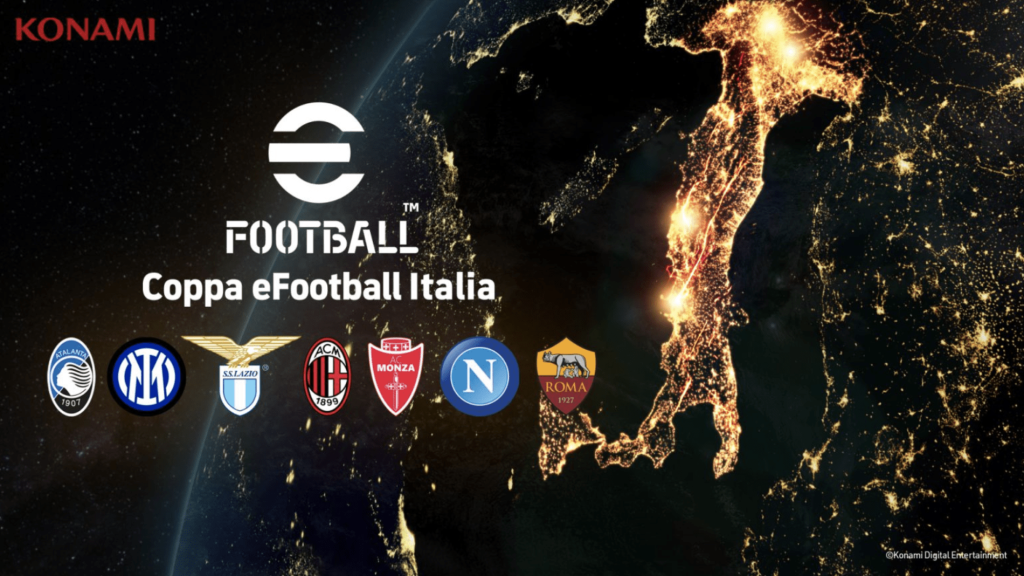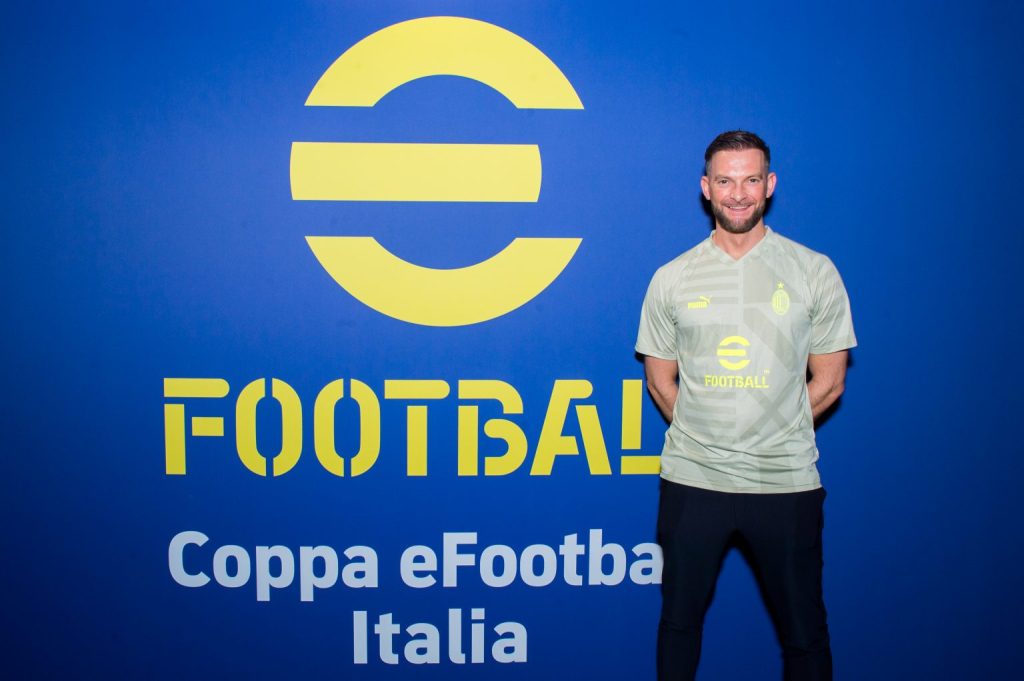
Seven Italian football clubs will battle it out in KONAMI’s eFootball title through March and April, with a catch: each team comprises three players from wildly different backgrounds.
The competition is called Coppa eFootball Italia, imitating one of the country’s official football competitions, the Coppa Italia, which runs parallel to Italy’s Serie A. Teams taking part in this competition are AC Milan, AC Monza, AS Roma, Atalanta BC, Inter Milan, SS Lazio and SSC Napoli.
All but one of them are exclusive partners of KONAMI, meaning their logos and players can’t be shown in EA’s or anyone else’s game. “Italy is one of our key markets not only in Europe but in the world,” David Monk, Head of Football Acquisition and Activation Europe at KONAMI, told Esports Insider. But what sets this competition apart from others is the process through which each club’s team has been built.
Three players will compete for each club: a professional esports player independently signed by the club, a member of the youth football team selected through an internal tournament, and a fan who emerged victorious from a unique open tournament called Konamici — a portmanteau which combines the words KONAMI, the name of the game’s publisher, and amici, Italian for ‘friends’. This format is the result of more than two years of work by Monk’s team that started with the first eFootball release in 2021.
Football as an esport is perhaps one of the more welcoming areas of competitive gaming for players. That’s because every year, almost every major football league in Europe hosts an open event to draft grassroots players that will be signed for an entire season by a top club. The ePremier League in the UK, the eSerie A in Italy and many more have decided to replicate in some way (albeit at a much quicker pace) the traditional system of football: youth teams leading to the big leagues.
All the major esports tournaments that are partnered with a country’s football league, such as the ePremier League and eSerie A, are a monopoly of EA Sports’ FIFA series — although it’s soon to lose the FIFA branding, since EA’s partnership with FIFA is about to end.
This has forced its competitor, eFootball (previously the Pro Evolution Soccer or ‘PES’ series), to innovate. Using Italy as a testbed, KONAMI, the Japanese publisher behind eFootball, has come up with a new competitive format that blurs the lines between grassroots, professional and influencer tournaments, hoping to attract casual viewers and hardcore fans alike.
“This competition is about creating something in collaboration with our partner clubs that is unique and innovative,” said Monk. “We prioritised structuring a competition that can both celebrate and also offer benefits to each group: youth players, esports players and fans.
“Once we considered this composition of three players, we then created a qualification pathway for each team member — either an in-house tournament in the case of youth team and esports players, or, looking broader, how to provide a mass participation qualification for all fans of each club fairly. We were then able to highlight particular individuals that have unique stories to tell and that can help create some inspirational content for the next generation of casual or pro gamers, and also football players.”
The cornerstone of this strategy is fan engagement. While most of the other football grassroots tournaments are designed to select a group of good players that the clubs then pick from, the Konamici cup is aimed at selecting the best fan of a certain team. Here is how it works.

All thanks to an in-game client, fans can select a certain club to represent, then the game automatically organises matches against other players who selected the same team. For example, the best player in AC Milan’s fan tournament gets enrolled automatically in the team. To ensure that all the members of the team have their chance at victory, the rules of the Coppa eFootball Italia dictate that every member of each team must play the same number of games as their teammates.
Monk gave an example: “We are at the stage when the professional player, who is also the coach, is deciding who to field for the next match; he looks at the opponents and sees that the other team is fielding the fan and youth player. He responds to this move by deploying himself and his fan to give himself an advantage. But he does it knowing that when his fan and his youth player face the opponent’s pro, they will have a chance at winning because he coached them. This tournament is all about creating dynamics that are interesting to watch both on and off the pitch.”
This entire circuit culminates with a live Grand Final hosted in one of Italy’s biggest pop culture and gaming conventions: Comicon in Naples. Grassroots esports, professional players, a previously untapped player base for esports events in the form of football youth teams, and a dash of influencer tournaments (in the form of promotional matches that will be broadcast along the Finals stage of the competition) all come together in the Coppa eFootball Italia, a big bet for KONAMI that, if successful, may lead to the model being replicated elsewhere.
“It is clear that we have created a compelling and innovative esports format with the Coppa eFootball Italia, so our first goal is to prove it can be successful in achieving our targets,” Monk continued. “Looking longer term, we can see that KONAMI has always considered esports as a core pillar of eFootball, so therefore we would certainly look to build on this concept and are always considering how to grow and develop it beyond its current structure and target market.
“We strongly believe that Coppa eFootball Italia is a genuine way to create a new generation of esports players at a grassroots level, to help create clear development pathways for future eFootball esports competitions beyond this one and also beyond Italy.”


